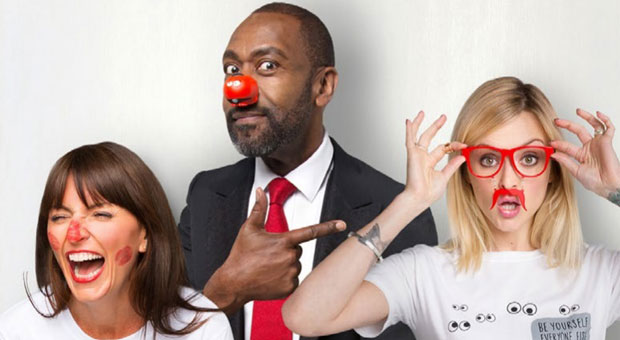Comic Relief 2015: 'it's going to blow everyone's socks off'
The biggest names in showbiz join forces to fight poverty and inequality – but how did Red Nose Day start?

A free daily email with the biggest news stories of the day – and the best features from TheWeek.com
You are now subscribed
Your newsletter sign-up was successful
This year, Comic Relief is expecting to use a night of "unmissable" entertainment to surpass £1 billion in total donations.
Red Nose Day has become something of a British institution, but how did the charity Comic Relief come about and where does the money go?
History
The Week
Escape your echo chamber. Get the facts behind the news, plus analysis from multiple perspectives.

Sign up for The Week's Free Newsletters
From our morning news briefing to a weekly Good News Newsletter, get the best of The Week delivered directly to your inbox.
From our morning news briefing to a weekly Good News Newsletter, get the best of The Week delivered directly to your inbox.
Comic Relief was founded by scriptwriter Richard Curtis and philanthropist Jane Tewson in response to effects of famine across east Africa. The charity's first television show was broadcast live from the Safawa refugee camp in Sudan by Noel Edmonds, and the first Red Nose Day was held three years later, raising £15 million.
The charity's mission is to drive positive change through laughter and entertainment. It spends its funds on tackling the root causes of poverty and social injustice in the UK and across Africa, and has raised over £950 million in less than three decades.
"Comic Relief these days is much more in line with shiny-floor shows like The X Factor – fast, zappy, presenter-led – but we were just asking everybody to be kind and help," host Lenny Henry told the Daily Telegraph.
Where does the money go?
A free daily email with the biggest news stories of the day – and the best features from TheWeek.com
Comic relief operates on a "golden pound principle", where every pound donated is spent on charitable projects, and all administrative and staffing costs are covered by its corporate sponsors.
The charity has helped over a million children in the world's poorest countries get an education. It also has a strong focus on healthcare, helping three million people affected by HIV/AIDS and protecting six million people from malaria in Africa. In the UK, the charity has fought for disability rights, changed attitudes towards mental health and helped victims of domestic abuse.
Controversies
In 2013, the BBC's Panorama revealed that Comic Relief invested millions of pounds of donations in shares in tobacco, alcohol and arms businesses, causing a public outcry. Last year, the charity said it had reviewed its investment practices and promised it would no longer invest in firms that contradict its core values.
What's planned for Friday 13th?
On this year's Red Nose Day, people are being encouraged to "make your face funny for money", take a selfie and then text "funny" to 70011 to donate £1.
Multi-award winning British singer Sam Smith and Oscar winner John Legend will collaborate on a special version of Smith's song Lay Me Down for the official Red Nose Day single. "It's a dream come true," Smith told the BBC.
Various events have been held across the country in the run-up to Red Nose Day, including Comedian Mark Watson's 27-hour live comedy marathon and Dermot O'Leary's 24-hour dance marathon (March 12, BBC One, 7pm)
On Friday, the highly anticipated six-hour telethon will be broadcast by the BBC, with stars Claudia Winkleman, Davina McCall and Lenny Henry presenting "an unforgettable evening of entertainment packed full of celebrity performances, comedy gold and silly spoofs".
The public will also be treated to the return of popular television favourites including Little Britain, Mr Bean and The Vicar of Dibley. "It's an extremely exciting event to be part of," McCall told the Daily Mirror. "There’s always something unmissable."
"It's going to blow everyone's socks off," added her co-host, Lenny Henry.
How to donate to Comic Relief:
By phone: call 03457 910 910 (standard charges from landlines and mobiles will apply)
Online: visit www.rednoseday.co.uk
By post: send a cheque or postal order made payable to Red Nose Day 2015 to Red Nose Day 2015, Ernst &Young, PO Box 51543, London SE1 2UG.
-
 The environmental cost of GLP-1s
The environmental cost of GLP-1sThe explainer Producing the drugs is a dirty process
-
 Greenland’s capital becomes ground zero for the country’s diplomatic straits
Greenland’s capital becomes ground zero for the country’s diplomatic straitsIN THE SPOTLIGHT A flurry of new consular activity in Nuuk shows how important Greenland has become to Europeans’ anxiety about American imperialism
-
 ‘This is something that happens all too often’
‘This is something that happens all too often’Instant Opinion Opinion, comment and editorials of the day